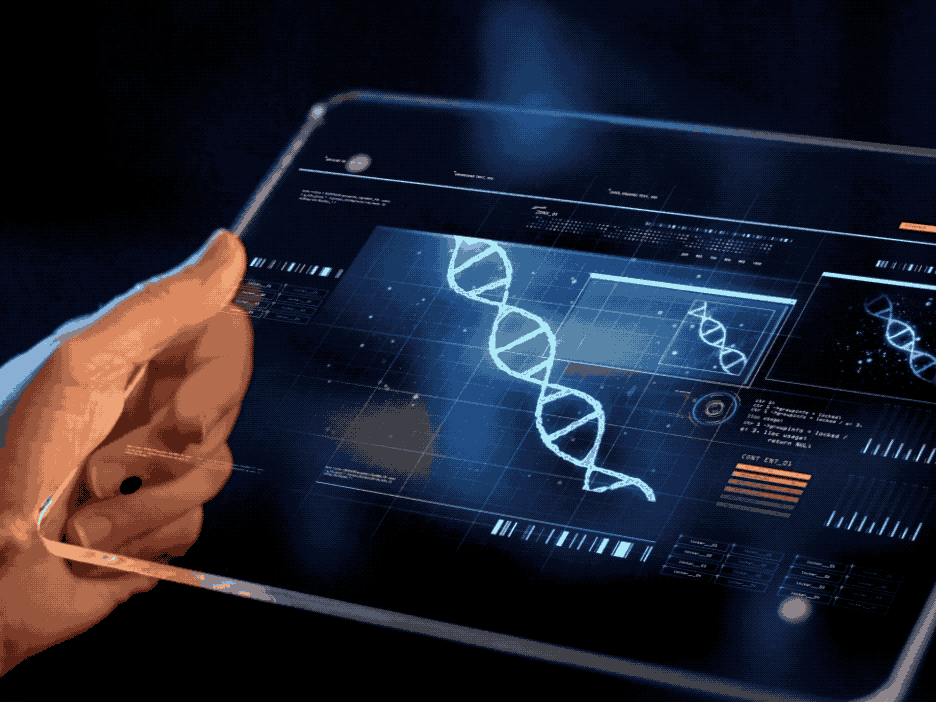- Academics
Bioinformatics, M.S.

Request More Information Apply FAQ
Become a Bioinformatics Leader
Revolutionary changes are taking place in how we interpret health and treat disease. With extraordinary advances in both gene sequencing and machine learning, the bioinformatics field is expanding exponentially and creating a myriad of opportunities for professionals with in-depth knowledge of techniques for mastering complex data.
In NYU Tandon’s Bioinformatics Master of Science program, you will build strong skills in molecular biology and big data analysis. Develop solutions to critical challenges throughout medicine and the life sciences by learning to utilize genomic information and next generation sequence analysis tools.
By creating and advancing algorithms, utilizing computational and statistical techniques, and applying theory, you can solve practical problems that arise in the management of biological data. Prepare to make significant contributions to society through groundbreaking innovations in cancer care, vaccine design, agriculture, and energy.
What Is Bioinformatics?
Bioinformatics is a rapidly growing discipline of science that applies computation and analysis techniques to the collection and interpretation of biology-related data. There is a strong demand for professionals with an advanced education in molecular biology, statistics, programming, machine learning, and sequence and pathway analysis.
Upon completing your bioinformatics degree, you will be well qualified to address important issues in areas such as infectious diseases, public health, genetic diseases, agriculture, and green technology.
Why Choose NYU Tandon?
At NYU Tandon, we are educating and nurturing tomorrow’s biotech rock stars. As a student in our flexible 30-credit program, you will develop the refined skill set necessary for a successful career in bioinformatics and computational biology. Prepare to make an impact on vital challenges such as Alzheimer’s, autism, diabetes, obesity, genetically modified organisms (GMO), and greenhouse gas sequestration.
Forge New Pathways in Bioinformatics
Take the next step! Submit your information to learn more about the Bioinformatics program.

NYU Tandon Bridge
Curriculum
Required Courses (18 Credits)
- 3 Credits Algorithms and Data Structures for Bioinformatics BI-GY 7453
- The online course is aimed at introducing the foundational ideas from computer science in designing and implementing bioinformatics algorithms. The goal of the underlying algorithms and data structures is to accurately abstract and model the biological problems and to devise provably correct procedures with efficient computational complexity bounds. The algorithms will be described in pseudo-codes in order to simplify the correctness and complexity analysis, but with sufficient details to enable the students implement them in any suitable software pipelines and hardware architectures.
Prerequisites: MA-UY 2314 - 3 Credits Problem Solving for Bioinformatics BI-GY 7663
- This course will introduce students to programming in Bioinformatics. The focus will be on object oriented techniques of scripting. Cancer data will be used as examples throughout the course.
- 3 Credits Biology and Biotechnology for Bioinformatics BI-GY 7683
- The online course is aimed at introducing the key ideas from biology and biochemistry and how they are used in modern biotechnology. The goal of this course is to develop students’ critical thinking and analytical reasoning skills in the specific context of biotechnology and its modern applications. This course will explore a plethora of technologies used in the fields of genetic engineering, forensics, agriculture, bioremediation and medicine in order to give the students a basic but fundamental experimental skill set which can be applied in conjunction with computational skills to solve biological problems in a scalable manner. Students enroll into this course should have knowledge of basic Sciences (Biology, Physics and Chemistry).
- BI-GY 7723 Please refer to the bulletin for more information
- 3 Credits Applied Biostatistics for Bioinformatics BI-GY 7673
- This online course will introduce the basics of statistics and its applications in various fields of biology. It will lean towards practical applications, allowing for an intuitive understanding of concepts and some rigor in the application of statistics. It will use R for all the programming exercises. The course will not be requiring a lot of programming, and the requisite skills will be introduced in the lectures. The problems, exercises and assignments will be drawn from real-life problems in research papers and books. The student should be able the initiate and solve problems in the field at the end of the course. Students enroll into this course should have knowledge of basics of programming, probability and statistics.
- 3 Credits Machine Learning and Data Science for Bioinformatics BI-GY 7743
- This online course is aimed at developing practical machine learning and econometric (time series) skills with applications to biological data. The course will use examples from bioinformatics application areas throughout and will emphasize translational aspects.
- Bioinformatics Capstone BI-GY 810X
- This online course is providing students an opportunity to work in a public or private research or production environment. This may include labs at companies in the private sector or independent research institutes and foundations, within or outside of Tandon. Students apply their skills (such as Python, R, UNIX, and Next Generation Sequence Analysis) in a real-life environment. Students who enroll in this course will work under the advisement of a Tandon Online faculty member. At the end of the course the student has to submit a final report/paper.
Prerequisites: BI-GY 7663, BI-GY 7673, BI-GY 7653
Capstone Project
At least three credits of Capstone course (BI- GY 810X BIOINFORMATICS CAPSTONE) are required to fulfill the M.S. Bioinformatics requirement for graduation. This is a variable credit course from 3cr to 9crs. Which means that you can take it for three or if you have six credits remaining you can take it for the six.
Choose a Concentration (6 Credits)
Laboratory Science Concentration (Required Courses):
- 3 Credits Proteomics for Bioinformatics BI-GY 7543
- The online proteomics course contributes an application focused specialty class to the bioinformatics curriculum. It will be a tour-de-force of modern proteomics methods and analysis in the context of practical research and clinical applications. The course will teach fundamentals, applications, experiments and predictions in parallel. Thus, each week will include a mix of interactive approaches from background learning, to understanding experimental methodology pro and con, to software usage and sophisticated bioinformatics approaches to prediction. Limitations and complementary of prediction methods will be emphasized. It is desirable (but not required) for students to complete a Biochemistry course before taking this course.
Prerequisites: Bioinformatics I. - 3 Credits Next Generation Sequence Analysis for Bioinformatics BI-GY 7653
- The online course is aimed at developing practical bioinformatics skills of next generation sequencing analysis. Students will be introduced to current best practices and in high-throughput sequence data analysis and they will have the opportunity to analyze real data in a high-performance Unix-based computing environment. Special attention will be given to understand the advantages, limitations, and assumptions of most widely bioinformatics methods and the challenges involved in the analysis of large scale datasets. Some of the topics that will be covered include, current sequencing platforms, data formats (FASTA, SAM, BAM, VCF), sequence alignment, sequence assembly, variant calling, RNA-seq analysis, and their biological applications. Students enroll into this course should have knowledge of Basic of programming, unix tools, and shell scripting.
Translational Science Concentration (Required Courses):
- 3 Credits Translational Genomics and Computational Biology BI-GY 7733
- This online course will introduce will expose the students to different aspects of the data analysis and modeling activities that are expected of a Bioinformatician or a Computational Biologist. This course will offer a wide spectrum of examples of applications roughly divided in two broad parts: (a) data analysis in a "translational" settings and (b) more "computational" approaches to Biology pertaining the simulation of biological systems. This course will explore a different set of online resources that contain complex data models of data (e.g., cancer data from TCGA and ICGC); the data thus collected will be used to expose novel model reconstruction tools. Other online resources and related exchange formats will be explored in order to show how simulation of biological systems models (and the related problem of their parameter tuning) in its different forms has become more and more usable and an important tool for biomedicine. Students enroll into this course should have knowledge of basics of programming, undergraduate calculus, probability and statistics, introductory cell biology.
Pre-requisites: BI-GY 7673 - 3 Credits Population Genetics and Evolutionary Biology for Bioinformatics BI-GY 7693
- The online course is aimed at introducing the key ideas from population genetics and how they are used to understand the interaction of basic evolutionary processes (e.g., including mutation, natural selection, genetic drift, inbreeding, recombination and gene flow) that determine the genetic composition and evolutionary trajectories of natural populations. The goal of this course is to develop students’ critical thinking and analytical reasoning skills in the specific context of many mechanisms shaping genetic variations and within and between populations. This course will equip the students with mathematical and experimental skills to address public health issues.
Electives (6 Credits)
- 3 Credits Transcriptomics BI-GY 7633
- Screening of differential expression of genes using microarray technology builds the opportunities for personalized medicine converging soon to medical informatics and to our health care system. The course will start with a discussion of gene expression biology, presenting microarray platforms, design of experiments, and Affymetrix file structures and data storage. R programming is introduced for the preprocessing Affymetrix data for Image analysis, quality control and array normalization, log transformation and putting the data together. Bioconductor software will be dealt with data importing, filtering, annotation and analysis. Machine learning concepts and tools for statistical genomics will be addressed along with distance concept, cluster analysis, heat map and class discovery. Case studies link the methodology to biomolecular pathways, gene ontology, genome browsing and drug signatures.
- BI-GY 7573 Please refer to the bulletin for more information
- 3 Credits Bioinformatics Guided Studies BI-GY 7753
- This online course is providing students an opportunity to work in a public or private research laboratory outside of NYU Tandon. This may include labs at companies in the private sector or independent research institutes and foundations. Students will have the chance to apply skills (such as Python, R, UNIX) acquired in other online courses in a real-life environment. Students who enroll in this course will work under the advisement of a Tandon Online faculty member. At the end of the course the student has to submit a final report or paper.
Prerequisites: BI-GY 7663, BI-GY 7673 and BI-GY 7653
BI-GY 7753 Bioinformatics Guided Studies: Not Required for Graduation. This is a 3 credit elective that can be taken for a max of six credits over two semesters.

